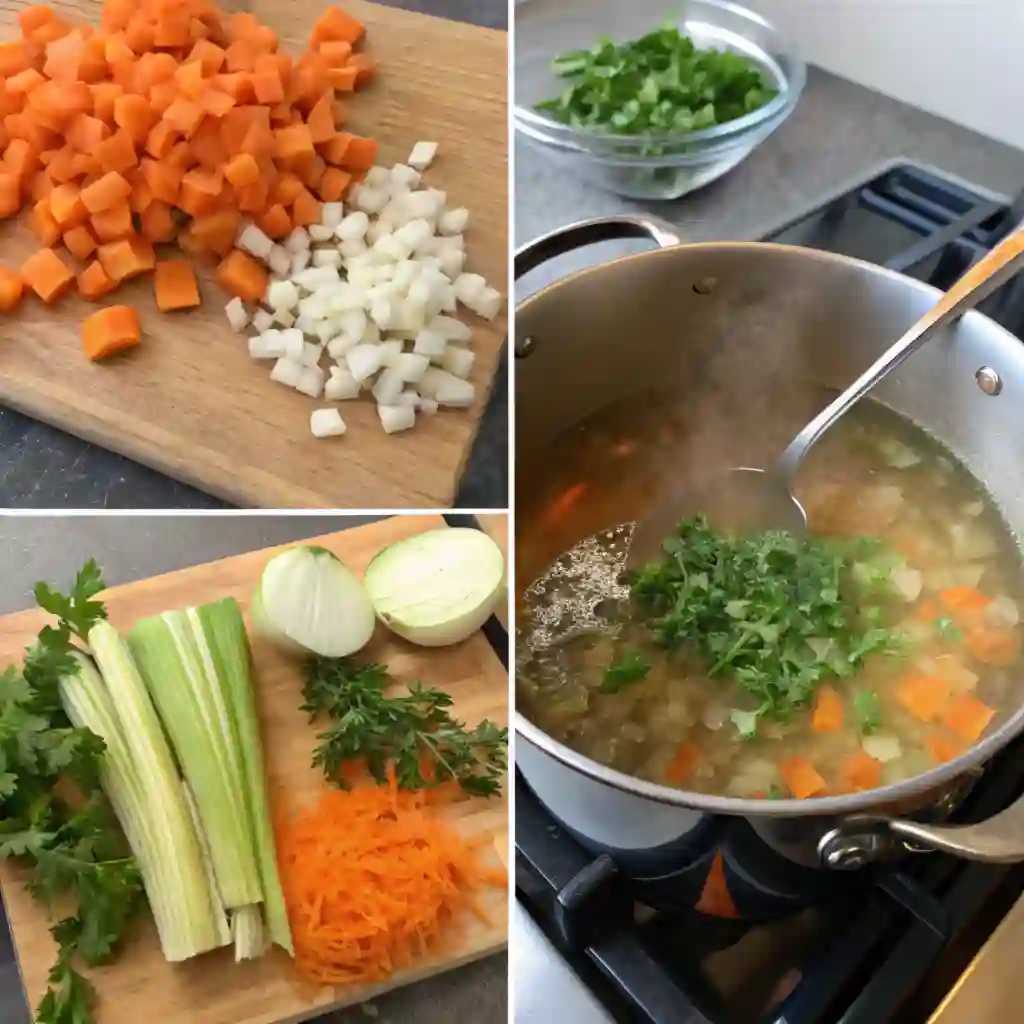Introduction
“Soup Boosts Immune System: A Delicious Way to Strengthen Your Health”
Soup has always been a comforting food, but did you know it can also boost your immune system? Whether soothing a sore throat or providing essential nutrients, soup does more than just warm you up. Its ingredients work together to keep your body strong and healthy. This article will explore how soup helps support immunity, the best ingredients to use, and tips for making your own healthy soups at home. Let’s dive in!
Table of Contents
The Science Behind Soup and Immunity
Why Soup Helps Boost Immunity
Soup has been a trusted remedy for colds and flu for centuries, and there’s a good reason why. Warm soups comfort you while keeping your body hydrated, which is key for a strong immune system. The warmth also soothes your throat, clears nasal passages, and makes breathing easier. Since soup is liquid, it helps your body absorb nutrients quickly, giving your immune system the energy it needs to fight off sickness.
Nutrients in Soup That Help Your Body
A good soup is full of vitamins and minerals that support your health. Carrots and sweet potatoes provide vitamin A, which helps your body’s defense barriers. Spinach and broccoli are loaded with vitamin C, a nutrient that helps fight infections. Proteins like chicken or beans give you zinc, which strengthens immune cells. Ingredients like garlic and onions are rich in antioxidants that protect your body from harmful substances.
How Broth Supports Your Health
The broth in soup isn’t just for taste; it plays a big role in keeping you healthy. Whether it’s chicken, vegetable, or bone broth, it provides hydration, electrolytes, and amino acids like glutamine. These nutrients support gut health, which is essential for immunity. Drinking hot broth also reduces inflammation in your nose and throat, making it a perfect choice during cold and flu season.
Ingredients That Make Soup a Superfood
Vegetables That Support Immunity
Adding the right vegetables to your soup can turn it into a healthy powerhouse. Carrots and sweet potatoes are full of beta-carotene, which your body turns into vitamin A to protect itself. Spinach and kale are rich in vitamin C, a key nutrient for fighting off germs. Garlic and onions not only add flavor but also have natural properties that can kill harmful bacteria and viruses.
Mushrooms like shiitake and maitake are another great choice. They contain special compounds that boost the activity of your immune cells. Including a mix of vegetables makes your soup flavorful and packed with nutrition.
Proteins That Strengthen Immunity
Protein is vital for a strong immune system, and soup is a great way to include it in your diet. Chicken is a classic option, providing zinc and amino acids that help repair and build immune cells. Plant-based proteins like beans, lentils, and chickpeas are also excellent choices. They’re rich in protein and fiber, which keeps your gut healthy—a key part of your immunity.
If you prefer, you can add tofu or tempeh to your soup. These soy-based options are full of compounds that reduce inflammation and boost your body’s defenses.
Spices and Herbs for Better Health
Spices and herbs not only make soup tastier but also boost its health benefits. Turmeric, with its active ingredient curcumin, fights inflammation. Ginger soothes your throat and helps clear your nose, while cayenne pepper improves circulation.
Herbs like thyme and rosemary are rich in antioxidants, which protect your body from harmful substances. Adding parsley or cilantro on top gives your soup a fresh flavor and a dose of vitamins A and C.
Best Types of Immune-Boosting Soups
Chicken Soup: A Classic Remedy
Chicken soup is a timeless choice for fighting colds—and for good reason. It combines protein, soothing broth, and immune-supporting ingredients. The hot broth helps clear nasal congestion, and the chicken provides zinc and amino acids that repair and strengthen cells. Adding vegetables like carrots, celery, and onions boosts the soup’s nutritional value. Studies even suggest that chicken soup can reduce inflammation and relieve cold symptoms.
Plant-Based Soups for Immunity
Vegetarian and vegan soups can be just as effective. Lentil soup, for example, is high in protein, fiber, and iron, which help your body fight infections. Miso soup, made with fermented soybeans, is another great option. It contains probiotics that support gut health and boost immunity. Adding spinach or mushrooms makes plant-based soups even more nutritious.
Soups Rich in Probiotics
Soups like miso and kimchi broth are packed with probiotics, which are good for your gut. A healthy gut is directly linked to a strong immune system. These soups are especially useful during flu season, as they help restore good bacteria that your body may lose when you’re sick or taking antibiotics.
How to Make Immune-Boosting Soup at Home

Choosing the Best Ingredients
To make a healthy soup, start with fresh vegetables like carrots, spinach, and sweet potatoes. These are packed with vitamins A and C, which strengthen your body’s defenses. Add garlic and ginger for their anti-inflammatory and germ-fighting properties. Proteins like chicken, beans, or lentils are great for cell repair and immune support.
Don’t forget herbs and spices like turmeric, thyme, and rosemary. They not only improve flavor but also provide antioxidants that protect your cells. A good broth—whether chicken, vegetable, or bone—serves as the base, offering hydration and nutrients.
Tips for Preparing and Cooking
How you cook soup can affect its nutritional value. Wash vegetables well to remove dirt and bacteria. Sauté garlic and onions first to enhance their flavor and health benefits. Simmer soup over low heat to preserve nutrients and allow flavors to blend.
Add delicate greens like spinach near the end of cooking to keep their vitamins intact. You can also include grains like quinoa or barley for extra fiber and protein.
Creative Add-Ins for Health
Boost your soup’s health benefits with some creative additions. A squeeze of lemon or lime adds vitamin C and a fresh flavor. Seeds like chia or flax provide omega-3s, which reduce inflammation. Stirring in yogurt or miso at the end adds probiotics to improve gut health.
For more creative ideas, try our Lentil Vegetable Soup Recipe for a hearty, immune-supporting meal.
Health Benefits Beyond Immunity
Hydration and Detoxification
One of the often-overlooked ways how soup boosts the immune system is by ensuring your body stays hydrated. Proper hydration is essential for immune function because it helps transport nutrients to cells and flushes out waste. Soups, particularly broth-based ones, provide a liquid-rich meal that replenishes fluids while offering electrolytes like sodium, potassium, and magnesium. These electrolytes are vital for maintaining energy and promoting cellular function, especially during illness.
Certain ingredients in soup further enhance its detoxifying properties. Celery, for instance, is a natural diuretic that encourages your body to eliminate excess water and toxins. Cucumber, when added to chilled soups like gazpacho, has similar detoxifying effects and provides a refreshing way to stay hydrated. Broth-based soups are also gentle on the stomach, making them perfect for those recovering from sickness or experiencing digestive issues.
Drinking warm soup not only hydrates but also supports respiratory health. The steam from hot broth can help clear nasal passages, making it easier to breathe while soothing inflamed sinuses. Combined, these benefits make soup an all-around champion for detoxification and recovery.
Supporting Gut Health with Soup

A healthy gut plays a critical role in overall health, including immune function. Broth-based soups, whether made from bones, vegetables, or both, are rich in collagen, gelatin, and amino acids like glutamine. These compounds help repair and strengthen the gut lining, which acts as a barrier against harmful pathogens and toxins. By maintaining a healthy gut lining, you reduce the risk of inflammation and promote better nutrient absorption.
Adding probiotic-rich ingredients to soup, such as miso paste or fermented kimchi, can further enhance gut health. These probiotics introduce beneficial bacteria to your digestive system, creating a balanced microbiome. A thriving gut microbiome is directly linked to a stronger immune response, as it regulates inflammation and helps fight off infections.
Fiber is another key component of gut-friendly soups. Ingredients like lentils, beans, and root vegetables provide prebiotic fiber, which feeds the good bacteria in your gut. The synergy between prebiotics and probiotics ensures your digestive system stays balanced and your immune system functions optimally.
Additional Health Benefits of Soup
Beyond hydration and gut health, soups offer a host of other health benefits. They’re an excellent way to sneak more vegetables into your diet, ensuring you get a variety of vitamins and minerals essential for overall wellness. The slow cooking process used in making soups helps release nutrients into the broth, making them more bioavailable and easier for your body to absorb.
Soups are also versatile and adaptable to dietary needs. Low-calorie options are ideal for weight management, while protein-packed soups support muscle recovery and repair. Bone broths, in particular, are rich in glycine and proline—amino acids that promote joint health and reduce inflammation.
By including a range of nutrient-dense soups in your meals, you’re not just focusing on how soup boosts the immune system—you’re investing in long-term health and well-being. For even more inspiration, check out our Split Pea Soup Recipe for a hearty, nutritious option that’s as comforting as it is good for you!
FAQs About Soup Boosts the Immune System
Can Soup Boosts Replace Supplements for Immune Health?
While soup is a great source of natural nutrients, it’s not always a full replacement for supplements. However, adding soup to your meals is one of the easiest and tastiest ways to strengthen your immune system. Ingredients like spinach, garlic, and sweet potatoes provide key vitamins like C and A, which help boost immunity. That said, if you have specific deficiencies, supplements may still be needed to meet your daily needs.
What Are the Best Soups for Cold and Flu?
Chicken soup is a classic for good reason. Its mix of protein, soothing broth, and anti-inflammatory properties makes it perfect for fighting colds and flu. Vegetable soups loaded with spinach, carrots, and mushrooms are also great choices. If you prefer plant-based options, lentil and miso soups provide gut-healing probiotics and immune-supporting nutrients.
How Often Should You Eat Soup for Immune Benefits?
To get the most out of soup for your immune system, aim to eat it two to three times a week. Regularly enjoying soups with a variety of ingredients ensures your body gets the nutrients it needs to stay healthy. During flu season or colder months, having soup more often can offer extra protection against sickness.
Pro Tips for How Soup Boosts the Immune System
Meal Prep Tips for Immune-Boosting Soups
Making soups in large batches is a time-saving way to stay healthy. Freeze portions in airtight containers or silicone freezer bags for quick, nutritious meals. Using ice cube trays for broth allows you to defrost small amounts as needed for recipes or quick sips. Always label containers with dates to track freshness.
Seasonal Ingredients to Enhance Immune-Boosting Soups
Another important tip for how soup boosts the immune system is to use seasonal ingredients. In winter, root vegetables like carrots and parsnips are nutrient-dense and perfect for hearty soups. Summer brings tomatoes, zucchini, and fresh herbs, which can be used in lighter soups. Eating seasonally not only ensures peak flavor but also provides your body with the nutrients it needs most during that time of year.
By following these tips, you can enjoy delicious, immune-boosting soups all year long. For more ideas, check out our Chicken Noodle Soup Recipe for a classic Soup Boosts, nourishing meal.








